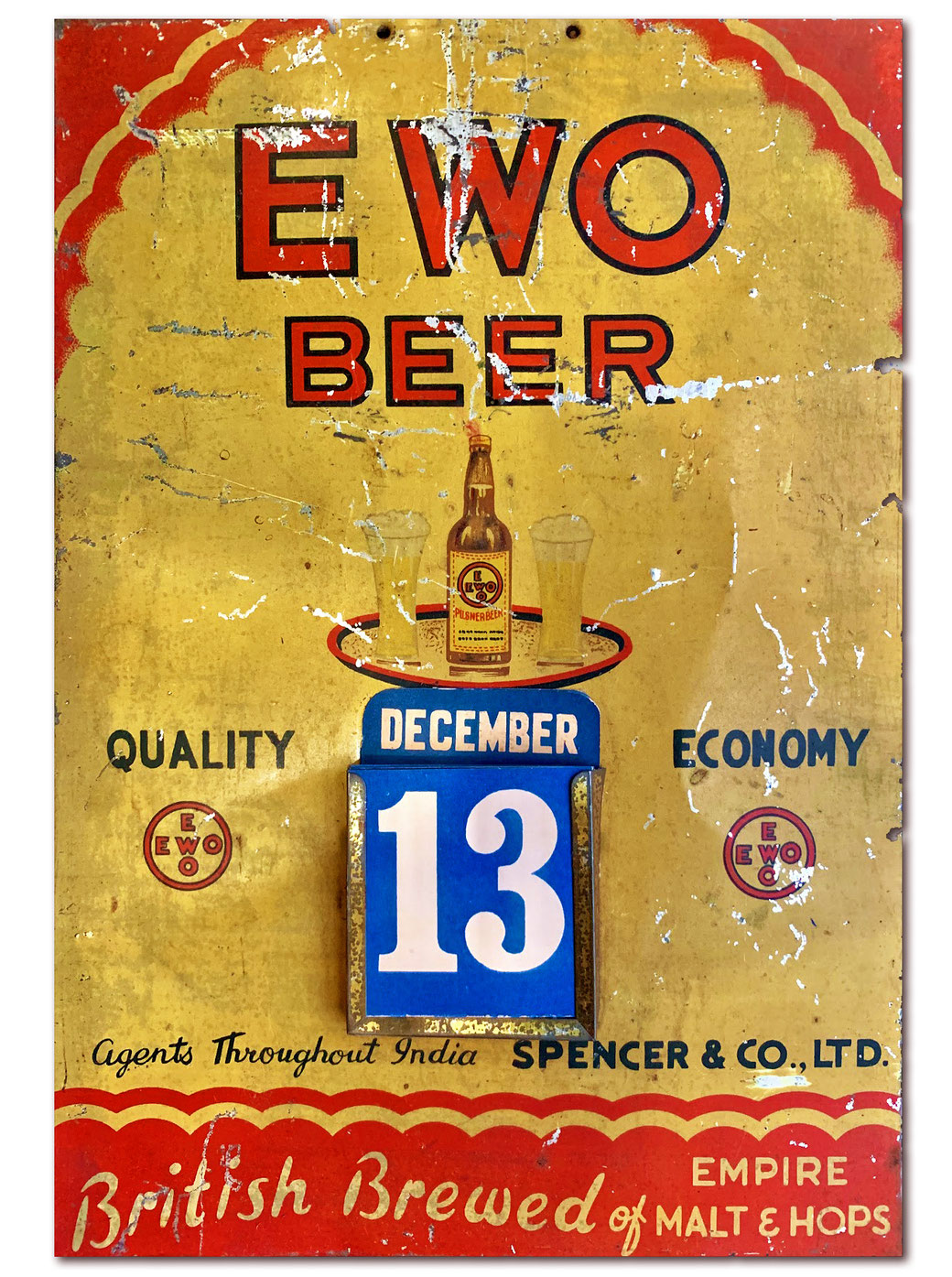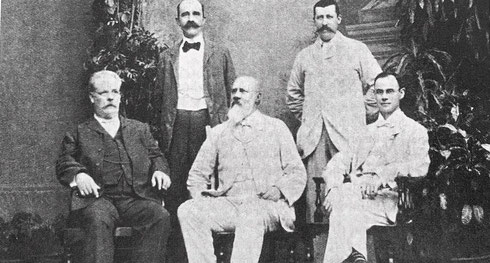
This EWO promotional calendar from our collection tells the story of a beer once brewed in China & exported around the world incl to India. Yet it also contains a touch of false advertising which tragically leads us to one of the most sardonic murder cases of Old Shanghai.

Established in 1936 by the British trading firm Jardine Matheson (“Jardines”) in Shanghai, the EWO brewery sought to challenge the longstanding dominance of U.B. Beer in the Chinese market since 1912. For a comprehensive history of these two competing Chinese beer makers, please refer to our previous post or explore author Mabel Waln Smith's recollection in the article above.
Unlike the Union Brewery, which to our knowledge only sold within China, EWO started to export its beers internationally after it became publicly listed in 1940. EWO’s management company Jardines, after whose Chinese moniker the brewery was named, was the biggest of the foreign trading conglomerates in China with wide reaching commercial connections globally.

India, the second largest country of both the British Empire and the world during that era, had already been introduced to European-style beer in the 1700s and was an obvious choice as export market for EWO. We can see from our metal calendar, that Jardines’ agent throughout India for selling the tasty brew was Spencer & Co Ltd., a sizeable trading firm, retailer and department store operator founded in Madras in 1863.

But the global ambitions of the British brewery from China did not end there: A 1947 company brochure recounts how during the war from 1941 to 1945 supplies of EWO beer were found at such far distant places as Tobruk and Greece. It goes on to boast how “German prisoners at Tobruk who had sampled captured EWO beer were unable to understand how such fine quality beer could be brewed in any country other than Germany."

The claim of "British brewed" on our collection's sign, however prompts a closer look. We already established that the brewery was located in China and after its IPO in 1940, Chinese investors bought up 75% of the stock. Jardines continued to manage the company, however only until the Japanese occupation of Shanghai in 1941, when the brewery was seized and remained under Japanese management until the end of the war. Arguably, neither ownership nor management necessarily matter when it comes to the actual art of brewing a fine ale. True beer connoisseurs will know that it all comes down to the ingredients and the skills of the brewmaster. So, who actually led production at the “finest and most up-to-date brewery in all of the Far East?” Turns out, the German prisoners at Tobruk were onto something after all…

Herr Karl Renner was born 1888 in Bavaria, Germany and had been managing a brewery in Havana before coming to China in 1934, where he “supervised first the erection of the EWO brewery plant and later its operation”. Already at the opening of the plant the English-language press in China corroborated how both the technical director of the brewery and his assistant were Germans “with a wide knowledge of all branches of the brewing profession”.
A fact that was conveniently omitted and twisted to “British brewed”, once the beer started to be internationally marketed as pride of the British Empire. It might very well have been this slightly deceptive advertising practice that cursed the brewery and haunts it to this day.

Why you may ask? Well, the two German beer master minds, Herr Renner and Herr Koneger (later replaced with Herr Holm), were not only handsomely paid but also housed in company-provided apartments on top of the brewery in the far-out Yangpu district of Shanghai. Karl Renner remained in charge of production from the inception of the brewery, throughout the Japanese occupation and after the plant was reclaimed again by its previous owners in the post-war years up to 1948.
This unfortunately, marks the time when our wholesome story of the internationally acclaimed German brewmaster from China, takes a sinister turn. Reader discretion is advised for the visuals shown in the following paragraphs.

Around midnight on Tuesday 24 February 1948 five armed men gained access to the brewery. Awakened from his sleep Karl Renner offered resistance to the burglars.
He was overpowered by them and silenced with blows on his head from beer bottles (!), according to evidence mentioned in news reports.
His wife, Frau Anna Renner was handcuffed and gagged when she hurried to her husband’s assistance.
Herr Renner subsequently also had his left hand chained to the staircase railing with a pair of handcuffs and his right hand tied to the stairway by a rope. It was there where he eventually succumbed to his deadly head injuries.

The armed gang then made a leisurely two-hour search of the house and finally decamped with gold bars, large sums of Chinese money, US dollars, diamond rings and other jewelry.
Two of the robbers were eventually apprehended and sentenced to life imprisonment in February 1949, while three remained at large including the alleged murderer of poor Herr Renner who was never caught.
Soon after, in May 1949, Shanghai fell to the People’s Liberation Army and Jardines was forced to sell the brewery to the new government at a loss in 1952, concluding the tragic ending to the EWO beer story. But was that really the final chapter?

Today, the old EWO plant created by Herr Renner still defiantly stands in the outskirts of Shanghai, and is in fact still used to produce beer. After many ownership changes in the past, as of 2023 it is part of Tsingtao’s Shanghai brewery complex. The brand of course represents China’s most well-known beer nowadays but originally was also founded by Germans in Qingdao in 1903. It almost appears as if the ghost of brewmaster Renner still dutifully watches over his old premises, roaming the halls at midnight and making sure his creation is never falsely advertised as “British brewed” again.






















Write a comment